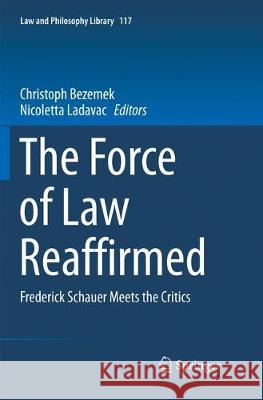The Force of Law Reaffirmed: Frederick Schauer Meets the Critics » książka
topmenu
The Force of Law Reaffirmed: Frederick Schauer Meets the Critics
ISBN-13: 9783319816487 / Angielski / Miękka / 2018 / 169 str.
Kategorie:
Kategorie BISAC:
Wydawca:
Springer
Seria wydawnicza:
Język:
Angielski
ISBN-13:
9783319816487
Rok wydania:
2018
Wydanie:
Softcover Repri
Ilość stron:
169
Waga:
0.27 kg
Wymiary:
23.39 x 15.6 x 0.99
Oprawa:
Miękka
Wolumenów:
01
Dodatkowe informacje:
Wydanie ilustrowane











